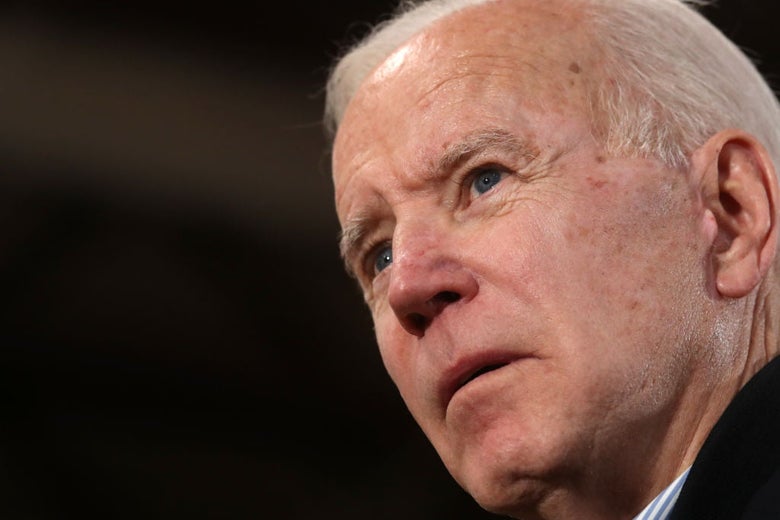
Joe Biden in Hudson, New Hampshire on Sunday.
Justin Sullivan/Getty Images
Joe Biden announced that he was running for president in April 2019 and soon led the Democrats’ crowded field by 25 points. His position in the Obama administration gave him instant access to top party donors and campaign operatives. He was endorsed by high-profile New York Gov. Andrew Cuomo and California Sen. Dianne Feinstein before he even entered the race. His name recognition was as universal as possible, and his pitch to voters—he’s Uncle Joe, the hot-headed but trustworthy ol’ rascal who’s just as comfortable negotiating in Congress as he is bullshitting with the boys down at the union hall—was already locked in.
With 75 percent of precincts reporting on Tuesday in New Hampshire, Biden was in 5th place with 8.3 percent of the vote. In Iowa, he placed 4th. He now trails a socialist in national polls and is quickly being caught by a small-city ex-mayor who barely clears the age requirement and a guy who endorsed George W. Bush and Dick Cheney’s reelection at the 2004 Republican National Convention.
As writer Jedediah Purdy noted, Biden’s campaign was always about confidence: The confidence that he would be an “electable” candidate because everyone else had confidence in him too. But his campaign rallies failed to generate the enthusiasm or attendance that his rivals’ did, his debate performances ranged from adequate to totally incoherent, and he didn’t even raise that much money. There’s not much for him to fall back on now that the confidence in his collective appeal is beginning to collapse.
Right now, Biden looks likely to become the fifth consecutive Democratic candidate in an open primary who failed to become president despite starting with major support from the party’s most powerful figures. In 2000, designated Clinton successor Al Gore put down a challenge from liberal free-thinker Bill Bradley in the primary—a CNN story from March 1999 described Gore’s “orchestrated rollout of endorsements” demonstrating his clear hold on the Democratic establishment—but lost, as it were, to George W. Bush. In 2004, John Kerry succeeded in reining in outsider candidate Howard Dean—who’d been denounced as an unelectable “McGovern-Mondale” extremist by the Democratic Leadership Council—before Iowa but also lost to Bush. (In the party’s defense, it didn’t necessarily anoint Kerry—Dick Gephardt, another experienced moderate, was also running—but it definitely didn’t want Dean to be the nominee, in part because of his then-radical belief that the Iraq War was a bad idea.) Hillary Clinton started the 2008 primary cycle with advantages in polling, endorsements, and large-donor fundraising, but lost to Barack Obama. She nearly lost an even larger lead in the 2016 primary, and then, in the general election … well, you know.
Now there’s Uncle Joe, who seemed to believe his party connections and public association with Obama would be so strong that he’d be able to coast to a primary win without having to spend significantly on ads, develop any signature proposals, or even appear that often in public. There’s still a little time left to, like, start doing that stuff: Biden’s polling leads in Nevada (Feb. 22 caucus) and South Carolina (Feb. 29 primary) are shrinking, but they still exist, and wins there could help him keep his numbers up in the southern Super Tuesday states where he’s been expected to do well with black voters. But the candidate whose sales pitch was that he came with forward momentum pre-installed is, so far, completely inert. If he still wants to win, he’ll have to earn it just like everyone else, without any help from his important friends.
Readers like you make our work possible. Help us continue to provide the reporting, commentary and criticism you won’t find anywhere else.
Join Slate Plusfrom Slate Magazine https://ift.tt/31NLMb5
via IFTTT
沒有留言:
張貼留言